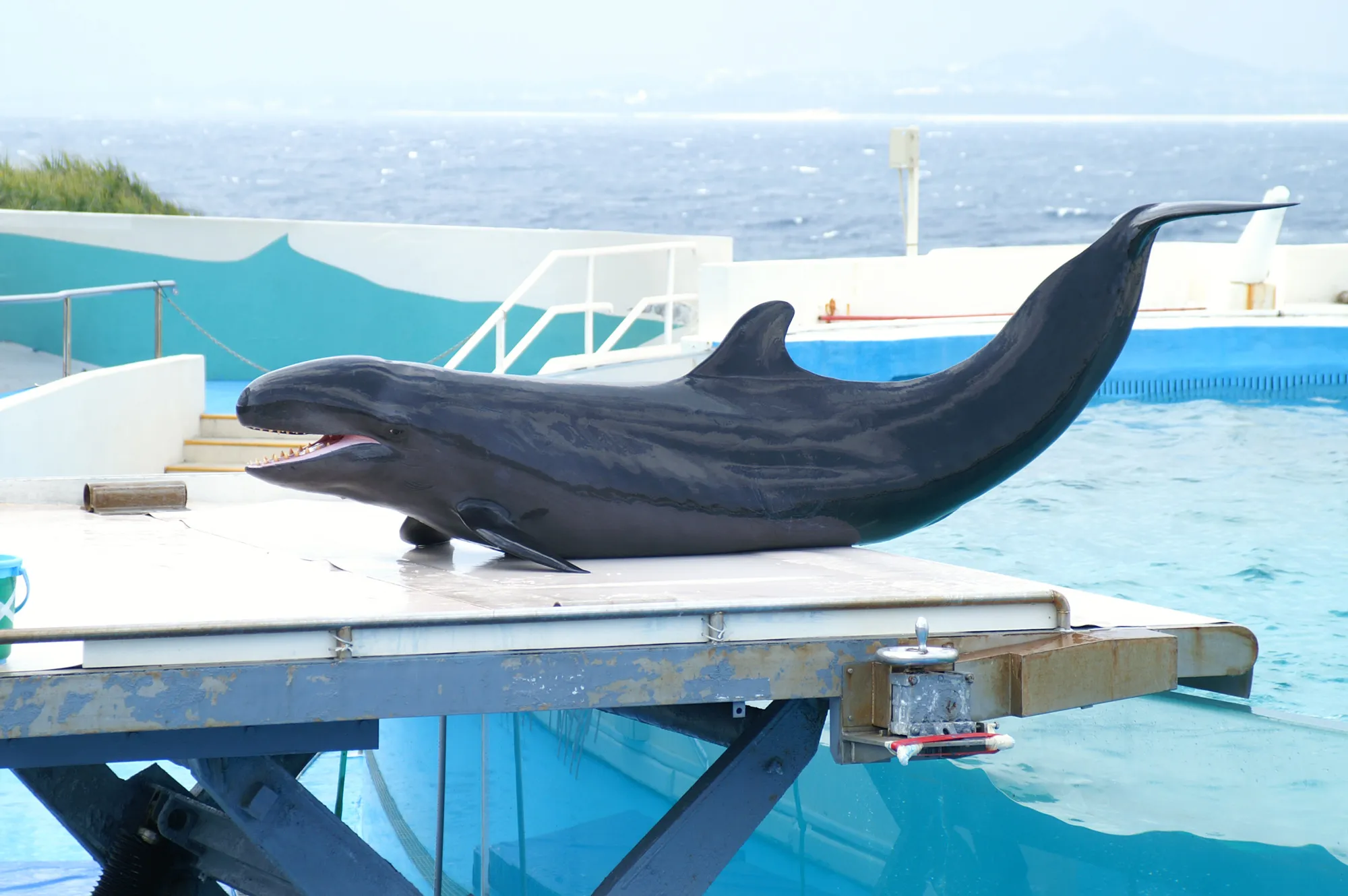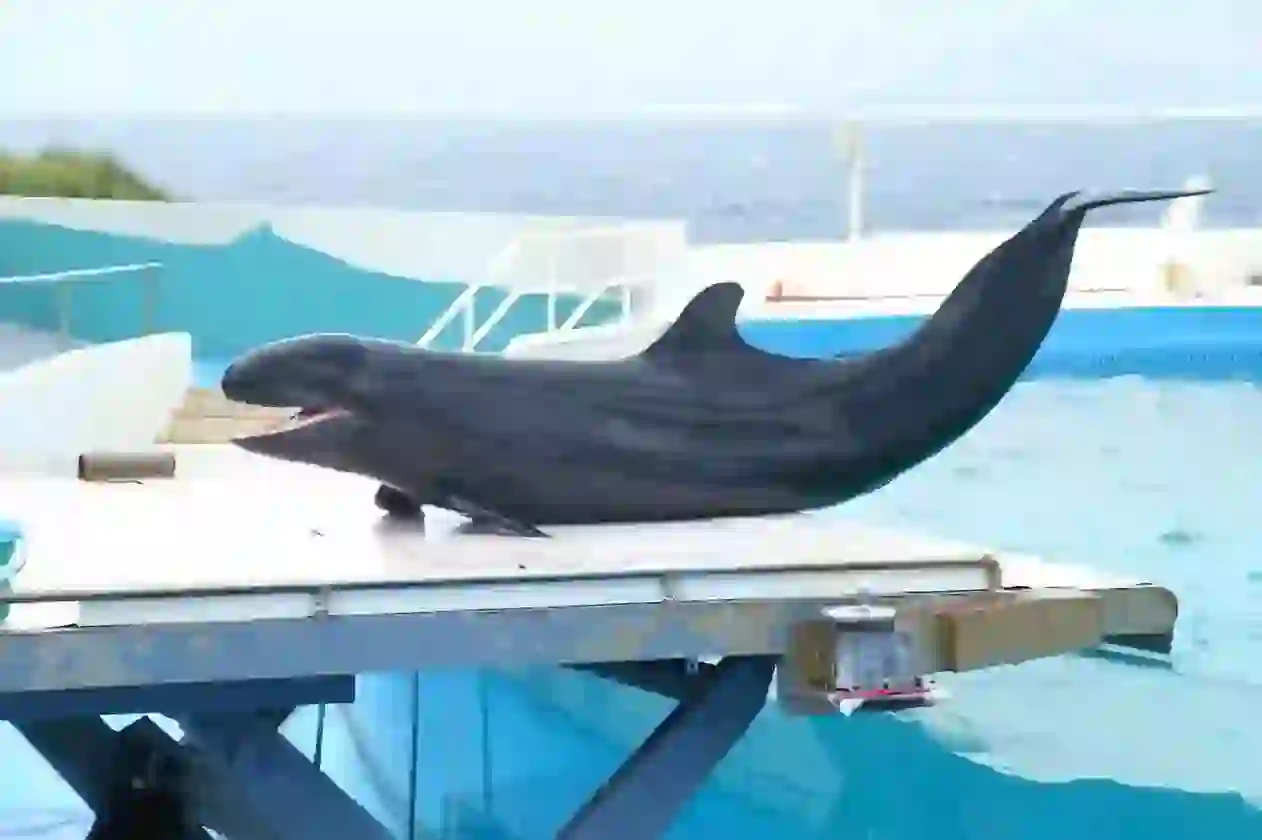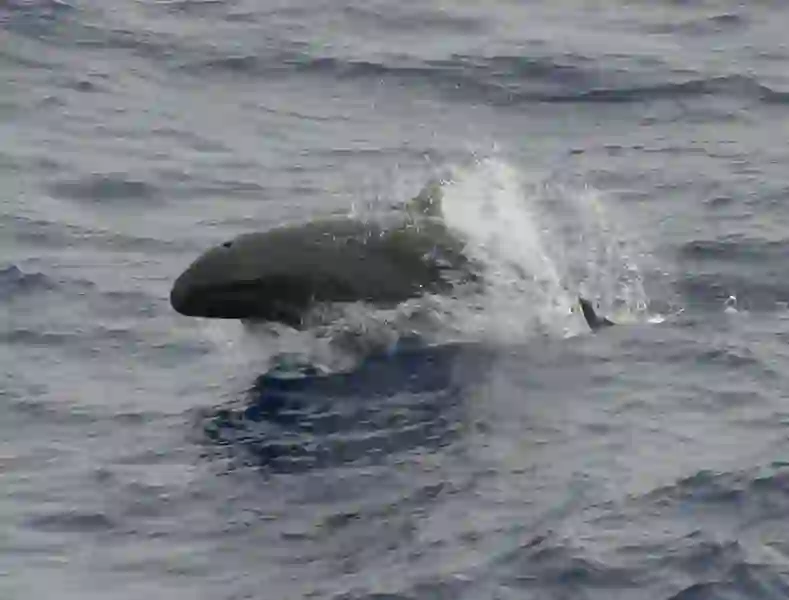
False Killer Whale
False Killer Whale
False Killer Whale
The false killer whale, cruising the vast ocean with its sleek, black body. Sometimes forming massive pods of hundreds, they resemble a dark current in the sea. Let's delve into the enigmatic ecology of the false killer whale and the threats they face.
False Killer Whale Basic Infomation

| Property | Value |
|---|---|
| Scientific Name | Pseudorca crassidens |
| Taxonomic Status | ACCEPTED |
| Rank | SPECIES |
| Vernacular Names | False Killer Whale |
| Kingdom | Animalia |
| Phylum | Chordata |
| Class | Mammalia |
| Order | Cetartiodactyla |
| Family | Delphinidae |
| Genus | Pseudorca |
| Habitats | Warm waters |
| Conservation Status | Least Concern |

Size
They are about 16 to 20 feet (4.9 to 6 meters) long and can weigh up to 3,300 pounds (1,500 kilograms). They are a large species of dolphin. Females tend to be slightly larger than males.

Lifespan
Their lifespan in the wild is estimated to be about 60 years.
_(http-www.bluekaymahahual.com)_-_panoramio_(1).webp?alt=media)
Distribution
They are found in warm waters around the world. They prefer the open ocean and rarely come close to coastal areas. They are occasionally seen off the coasts of Japan.
False Killer Whale Q&A

What kind of dolphin is the false killer whale?
The false killer whale is a species of oceanic dolphin belonging to the family Delphinidae and the genus Pseudorca.
As their name suggests, they are often found offshore, which is how they got their name in Japanese, 'okigondo' (沖合鯨). In English, they are called 'false killer whales' because they resemble orcas in appearance. 'False' means 'not real,' and while they are not orcas, they have a similar black, large body, hence the name. They are a highly social species, often forming large pods, sometimes exceeding 100 individuals! They are known to eat fish and squid. They are also highly intelligent and are known to exhibit complex communication.

What do false killer whales eat?
False killer whales are carnivores and mainly feed on fish and squid.
They use their sharp teeth to catch their prey. They sometimes hunt alone, but often hunt cooperatively in groups, herding and encircling their prey. They also use echolocation to find their prey, emitting sound waves to understand their surroundings and pinpoint the location of their prey. They are known to attack dolphins and whales larger than themselves. They have also been known to engage in cannibalism.
_(http-www.bluekaymahahual.com)_-_panoramio_(1).webp?alt=media)
[Quiz!] Why do false killer whales mass strand?
Stranding is when whales or dolphins swim into shallow water and become unable to return to the sea on their own. When this happens to multiple individuals at the same time, it is called a 'mass stranding.'
False killer whales are known to mass strand. While the reason for these mass strandings is not yet fully understood, there are a few theories:
・Malfunction of echolocation: False killer whales use echolocation to navigate, but in shallow water, the sound waves don't reflect properly, which can cause them to accidentally swim into shallows.
・Following the leader: False killer whales have a tendency to follow their leader when traveling in a pod. If the leader mistakenly swims into shallow water, the rest of the pod may follow, leading to a mass stranding.
・Illness or injury: Individuals that are sick or injured may become disoriented and stray into shallow water, leading to a stranding.
・Geomagnetic anomalies: They may lose their sense of direction in areas where the Earth's magnetic field is disrupted, causing them to strand.
・Panic: Loud noises from ships or earthquakes can cause them to panic and flee into shallow water, resulting in a stranding.
Mass stranding is a serious issue for dolphins and whales, as it can be fatal. Stranded dolphins and whales require immediate rescue. Returning them to the sea requires a large number of people and heavy machinery. Stranded dolphins and whales are often weak and require treatment by veterinarians. We need to think about what we can do to prevent mass strandings of dolphins and whales.
_(http-www.bluekaymahahual.com)_-_panoramio.webp?alt=media)
[Quiz!] Are false killer whales endangered?
The false killer whale is listed as 'Least Concern' on the IUCN (International Union for Conservation of Nature) Red List.
This means that they are not currently considered to be at risk of extinction. However, their numbers may be declining due to marine pollution, bycatch from fisheries, and collisions with ships. To protect false killer whales, we need to protect the marine environment and learn more about them.

Would you like to become a part of the 'Animalbook.jp'?
Turn your knowledge into Q&A and share it with the world. ※Publication will be activated after purchase. Let's share information together!
False Killer Whale Type of List

Characteristics of False Killer Whales
- Black body resembling an orca
- Rounded head
- Large dorsal fin
- About 16 to 20 feet (4.9 to 6 meters) long
- Weigh up to 3,300 pounds (1,500 kilograms)
- Highly social
- Form large pods
- Primarily eat fish and squid
- Least Concern (LC), but there are concerns about bycatch from fisheries
Information
Congratulations! You are the first commenter!

Create Your Favorite List!
False Killer Whale
Save the animals you love! Build your own list to quickly revisit your favorites later.

Would you like to leave a comment?
※Please note: This is for the purchase of rights to post comments within the article.
Find Your Favorites!
Our shop offers a unique and attractive selection of goods themed around various animals.
False Killer Whale References
False Killer Whale Introduction of media used

Hideyuki KAMON, CC BY-SA 2.0, via Wikimedia Commons

via Wikimedia Commons
_(http-www.bluekaymahahual.com)_-_panoramio_(1).webp?alt=media)
Juan Ortega, CC BY 3.0, via Wikimedia Commons
_(http-www.bluekaymahahual.com)_-_panoramio.webp?alt=media)
Juan Ortega, CC BY 3.0, via Wikimedia Commons

Help Enrich Our Animalbook.jp with Your Media!
We are constantly looking to expand and enrich our Animalbook.jp with amazing photos and videos of animals. If you have any media that you'd like to share, please contribute and help us showcase the beauty and diversity of the animal kingdom. Your submissions will be credited and featured in our encyclopedia, reaching a wide audience of animal lovers.


















